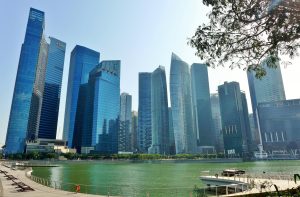Asia Pacific property markets continue to generate long-term opportunities despite COVID-19 outbreak
- Singapore property markets see the emergence of promising segments where great investment opportunities could come up such as logistics properties, quality office buildings, central business district (CBD) residential and hotels
- Government policies to help Chinese markets recover from the coronavirus outbreak
- Property markets in Hong Kong and Singapore offer value-buying opportunities for long-term investors amid uncertain outlook
- Japan’s logistics segment expected to benefit; office segment retains appeal; hotel and retail sectors hit hard by the virus
- Seoul’s office sector performed well, but a prolonging of the virus outbreak could hurt sentiment
- Resilient property markets in Australia and New Zealand face a temporary slowdown
 Colliers International on 22 April, released its Asia Pacific Market Snapshot Q1 2020 report. This multi-sector report examines the prior quarter’s market performance in 19 Asia Pacific property markets and provides forecasts for the quarter ahead.
Colliers International on 22 April, released its Asia Pacific Market Snapshot Q1 2020 report. This multi-sector report examines the prior quarter’s market performance in 19 Asia Pacific property markets and provides forecasts for the quarter ahead.
Terence Tang, Managing Director of Capital Markets, Asia commented, “Even though signs of the pandemic weighing on sentiment were seen across the region, opportunities are emerging across some markets and industry sectors in Asia Pacific. While the full extent on regional property markets is still unclear, robust government stimulus packages and solid economic fundamentals are cushioning impacts.”
Tang Wei Leng, Managing Director for Singapore added, “It is difficult to estimate the bottom in any crisis but investors could bear in mind the pattern of opportunities emerging rapidly from the aftermath of past crises. Singapore has strong market fundamentals; investors with a long-term view will benefit from the current environment as the disruptions will be temporary. Importantly, investors should keep abreast with evolving changes affecting priorities and preferences as well as stay close to the market to seize the moment.”
Singapore opportunities expected to emerge in the logistics and premium office sectors
Singapore‘s residential sector performed relatively well in the first quarter, but an unpredictable economic outlook could limit home sales and new projects. A slowdown is also expected in the city-state’s commercial sector as remote working measures gather pace to contain the virus; however, opportunities are expected to emerge in the logistics, premium office building, hotel segments and CBD residential.
Among Asia Pacific property markets, Chinese cities see development and fast-tracking for growth
Several policy initiatives have been introduced by national and local governments to support China’s property markets, including facilitating cash flows to developers in Guangzhou and Shenzhen; promoting the simultaneous development of districts and counties surrounding Beijing; and fast-tracking the growth of Shanghai as a global financial hub. China, as one of the first markets in the region to be affected by the virus outbreak, is now gradually returning to normal.
Japanese logistics sector in Asia Pacific property markets sees e-commerce expansion
Japan’s hospitality and retail property markets bore the brunt of the pandemic’s impact in the first quarter; however, Tokyo’s office sector, where pre-commitments for 2020 account for 85% of supply, held firm, and the logistics segment is expected to perform well as virus containment measures lead to growth in e-commerce.
In offices and industrial conversion opportunities among Asia Pacific property markets, Hong Kong is showing appeal
Investors in Hong Kong’s property market, beset by a succession of challenges – from last year’s protests and the US-China trade dispute to the coronavirus outbreak – remained understandably wary in the first quarter; however, long-term investors should find attractive opportunities with capital values expected to decline over the next quarter across several sectors, with offices and industrial conversion opportunities showing appeal and hotels for rebound uplift.
Seoul office sector going strong in Asia Pacific property markets
The South Korean capital saw office transactions worth nearly US$2 billion close in the first quarter, helped by votes of confidence from big-name foreign investors such as KKR. Seoul‘s office sector should remain upbeat with further deals expected throughout 2020 unless a prolonging of the virus outbreak affects sentiment.
Positive response to government action in Australia, New Zealand
Although property markets in Sydney, Melbourne, Brisbane and Auckland — which are among the region’s most desirable and cost-competitive — faced a slower first quarter, markets still saw some transactions and settlements. Government policies and planned investments in infrastructure have been viewed favourably by the global investor market and the expectation is that the slowdown should only be temporary.
In an earlier report, Colliers said that Singapore remains an attractive top investment destination. Colliers Research projected that Singapore investment sales volumes will grow on average by 5% per annum in longer-term, over 2019-2024 despite a 24% forecasted drop year-on-year (YOY) in 2020 as Singapore’s strong policy response to the coronavirus (COVID-19) pandemic is reinforcing its safe haven status.
Despite Covid-19 challenges Singapore remains top investment destination for the long term
Jerome Wright, Senior Director of Capital Markets at Colliers International, said, “The global disruption to economic activity caused by COVID-19 will mean challenging times in the short-term. However, the longer-term fundamentals of the Singapore real estate market remain strong and intact, and we can expect the market to recover as the successful control measures are lifted and industries regain full momentum.”
In the short-term, based on advance estimates from the Ministry of Trade and Industry (MTI), Singapore’s Q1 GDP contracted by -2.2% YOY, and Singapore is experiencing the worst decline since the global financial crisis.
In addition, according to Oxford Economics, as of 24 March 2020, the Singapore economy is forecast to head into its first recession in two decades, putting 2020 growth in the range of -4% to -1%.





